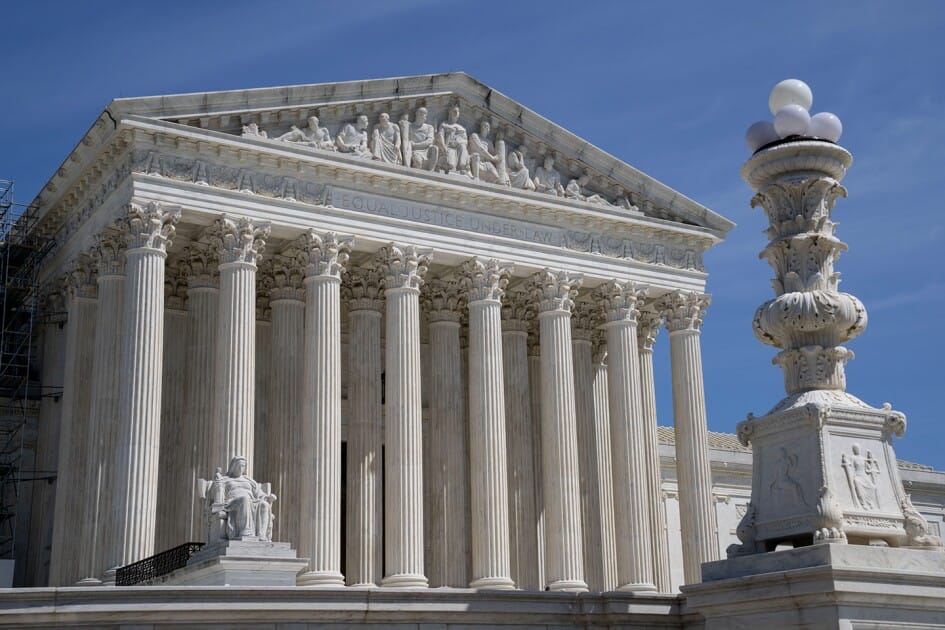The U.S. Supreme Court has agreed to hear the appeal of parents who object on religious grounds to a Maryland school district’s policy of preventing them from opting their children out of LGBTQ+ inclusive “storybooks” used in elementary English/language arts classes.
Lower courts had refused to block the policy of the 160,000-student Montgomery County school district, and the parents’ case has become a rallying point among groups fighting sexual orientation- and gender identity-inclusive school policies.
A federal appeals court’s ruling “that parents essentially surrender their right to direct the religious upbringing of their children by sending them to public schools … contradicts centuries of our history and traditions,” says the appeal, filed by the Becket Fund for Religious Liberty on behalf of a group of Christian and Muslim parents who objected to the books.
The school system in 2022 approved books such as Pride Puppy!, My Rainbow, and Uncle Bobby’s Wedding to help teach reading to students as young as pre-kindergarten. An associate superintendent said in court papers that the books were not meant to explicitly teach about gender identity and sexual orientation in elementary school, but to be a classroom option for students to discover and for teachers to recommend to some students.
The parents sued after the district began enforcing the no opt-out policy for the 2023-24 school year. They argue that the policy violates their First Amendment right to free exercise of religion and their 14th Amendment due-process right to direct the upbringing of their children, an argument that has also been made in court cases about policies regarding how districts treat students who say they’re transgender.
The case “presents a pressing issue of nationwide importance,” says the parents’ appeal in Mahmoud v. Taylor, and the lower courts’ “deference to public school policymaking is particularly dubious when it comes to instruction on family life and human sexuality.”
The appeal has the support of friend-of-the-court briefs filed by several leading religious liberty scholars, the Christian Legal Society, and 25 states.
“The lower courts are hopelessly confused—and largely wrong—about the nature of religious coercion in the school instructional context,” said the scholars’ brief, led by Douglas Laycock of both the University of Texas and University of Virginia. “When the government seeks to instruct students about value-laden sexuality and gender issues in a way that contradicts their parents’ religious instruction, without telling the parents or providing an opt-out, the parents’ First Amendment rights have been burdened.”
The Montgomery County district in October dropped Pride Puppy! and My Rainbow from the curriculum, which continues to use other titles such as Intersection Allies, Born Ready, and Jacob’s Room to Choose.
School district says it is trying to create a safe and inclusive learning environment
The district, in a brief urging the court not to take up the case, said the challengers “seek to unsettle a decades-old consensus that parents who choose to send their children to public school are not deprived of their right to freely exercise their religion simply because their children are exposed to curricular materials the parents find offensive.”
The district noted that it first tried to accommodate opt-out requests by parents, no matter what the basis.
“The growing number of opt-out requests, however, gave rise to three related concerns: high student absenteeism, the infeasibility of administering opt-outs across classrooms and schools, and the risk of exposing students who believe the storybooks represent them and their families to social stigma and isolation,” the district’s brief says.
Such consequences would defeat the district’s efforts to ensure safe and inclusive classroom environments, the brief says.
The case could be argued in April and decided by the end of the court term in late June.
Special education case was also granted by the court
The justices also granted review in a special education case that raises the question of which standard courts must apply when it comes to the rights of students with disabilities under the Rehabilitation Act of 1973 and the Americans with Disabilities Act of 1990.
The question in A.J.T. v. Osseo Area Schools is whether those statutes are violated with respect to students with disabilities only when school officials act with “bad faith or gross misjudgment,” as opposed to a more lenient standard of not having to prove any wrongful intent. The case could also be argued and decided in the current term.
2025-01-17 22:10:01
Source link

